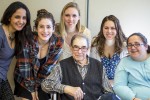Last winter, Ariel Azhdam nervously approached a Holocaust survivor sitting at a table in front of him, unsure of what to expect and afraid he would ask the wrong questions. Two months later, he found his personal hero in the same man who eagerly recounted his experiences as part of the Bearing Witness program at UCLA.
The Bearing Witness program allows students to meet with Holocaust survivors every other week for lunch at Hillel, an off-campus Jewish center on Hilgard Avenue.
“I enjoyed Bearing Witness more than I could have imagined,” said Azhdam, a third-year psychobiology student. “At first, I wasn’t sure how my survivor, Ernie, would feel telling his story, and I was a bit hesitant to ask questions.”
Azhdam said he became more comfortable when he saw how willing Ernie was to share the story of his expulsion from former Czechoslovakia and his experience in multiple concentration camps.
“When I asked (him about) the most important lesson he wanted me to take away, he grabbed my arm, stared into my eyes and passionately told me to never give up on anything,” Azhdam said. “He never gave up at any point, and told me that if he can maintain courage in anything, so can I.”
Last year, Bearing Witness partnered with the Museum of Tolerance, a museum dedicated to honoring Holocaust victims, to bring in 24 survivors who met and shared their experiences with students, said Catherine Eshaghzadeh, co-president of Bearing Witness and a third-year psychobiology student.
Eshaghzadeh added she emphasizes students who want to participate in the program should apply now.
“It’s really important for people to do this before they don’t have the chance to anymore,” she said. “This is the last generation of survivors.”
Program organizers are trying to sustain the program by contacting new survivors, said Talia Kamdjou, co-president of Bearing Witness and a fourth-year neuroscience student. In previous years, each student made a video documentary that cataloged survivors’ stories, so first-hand accounts of each story can still be shared with future generations.
The program takes place during the first eight weeks of winter quarter, and consists of lunches every other Wednesday at noon. On alternating weeks, students who participate in the program also partake in reflective sessions that feature guest speakers. Some are also enrolled in the fiat lux course German 19: “Bearing Witness: Interviewing Holocaust Survivors in Digital Age.”
Applications for Bearing Witness opened Monday, Nov. 9 and will close on Monday, Nov. 30.
